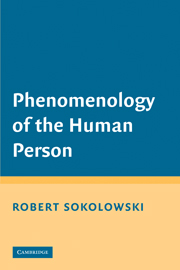17 - Aristotle
Published online by Cambridge University Press: 05 June 2012
Summary
The resources provided by phenomenology allow us, I believe, to transcend the difference between ancients and moderns. They offer a way to pursue philosophy as such, without being forced to be contemporary only at the price of turning away from the ancients. They permit us to read classical writings not just as historical phenomena but as material for recapitulation. We have in this book made use of authors from various historical periods, but before concluding, it would be appropriate to spell out more explicitly how my approach to language, meaning, and truth is related to classical philosophy. I will comment briefly on Aristotle and Thomas Aquinas.
Aristotle explicitly presents what can be called an identity theory of truth. He claims that the knower cognitively takes on the eidos of what is known, and that the knower and the known are cognitively identified. There are, however, also elements of a representational theory of truth in Aristotle. We will examine both these approaches and the tension between them. I believe that the tension can be resolved by appealing to the special character of philosophical language, transcendentalese, and I will present that resolution in Chapter 19.
Two Kinds of Truth
Aristotle, in Metaphysics, IX 10, distinguishes between two kinds of truth: truth as the correctness of speech and thought, and truth as the grasping of indivisibles (asyntheta, adiaireta).
- Type
- Chapter
- Information
- Phenomenology of the Human Person , pp. 273 - 285Publisher: Cambridge University PressPrint publication year: 2008



